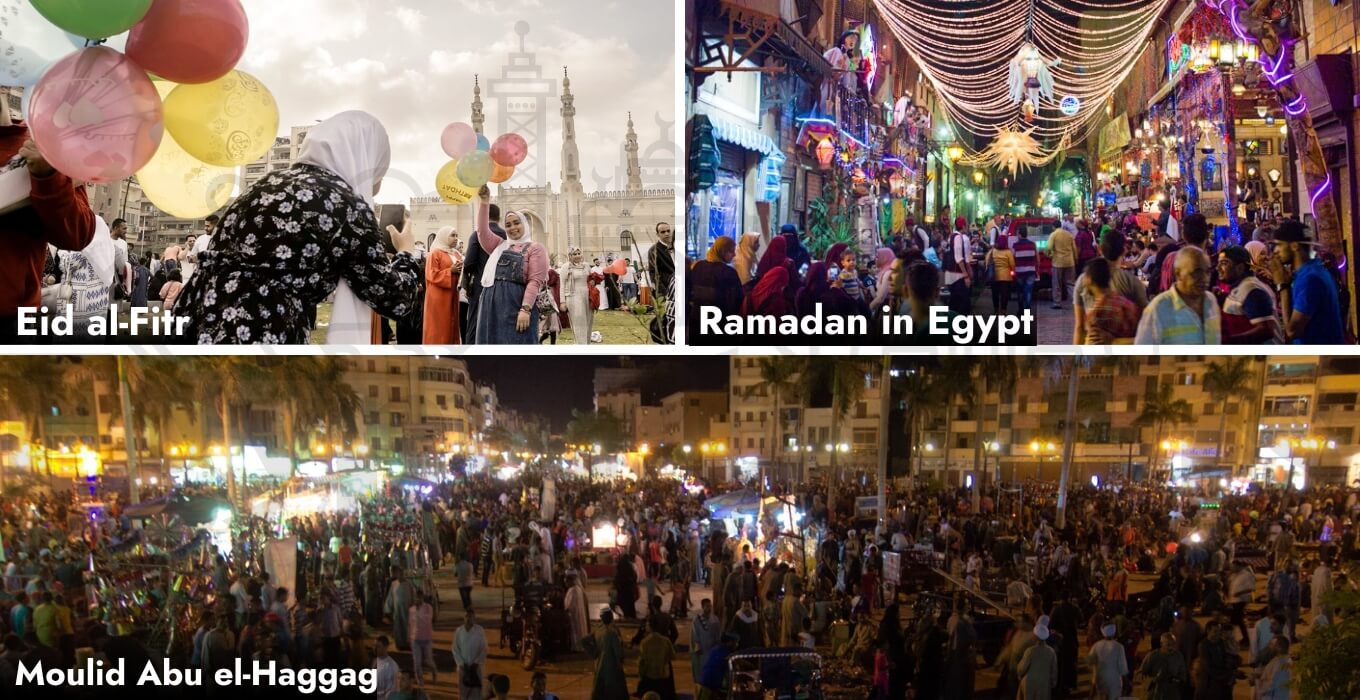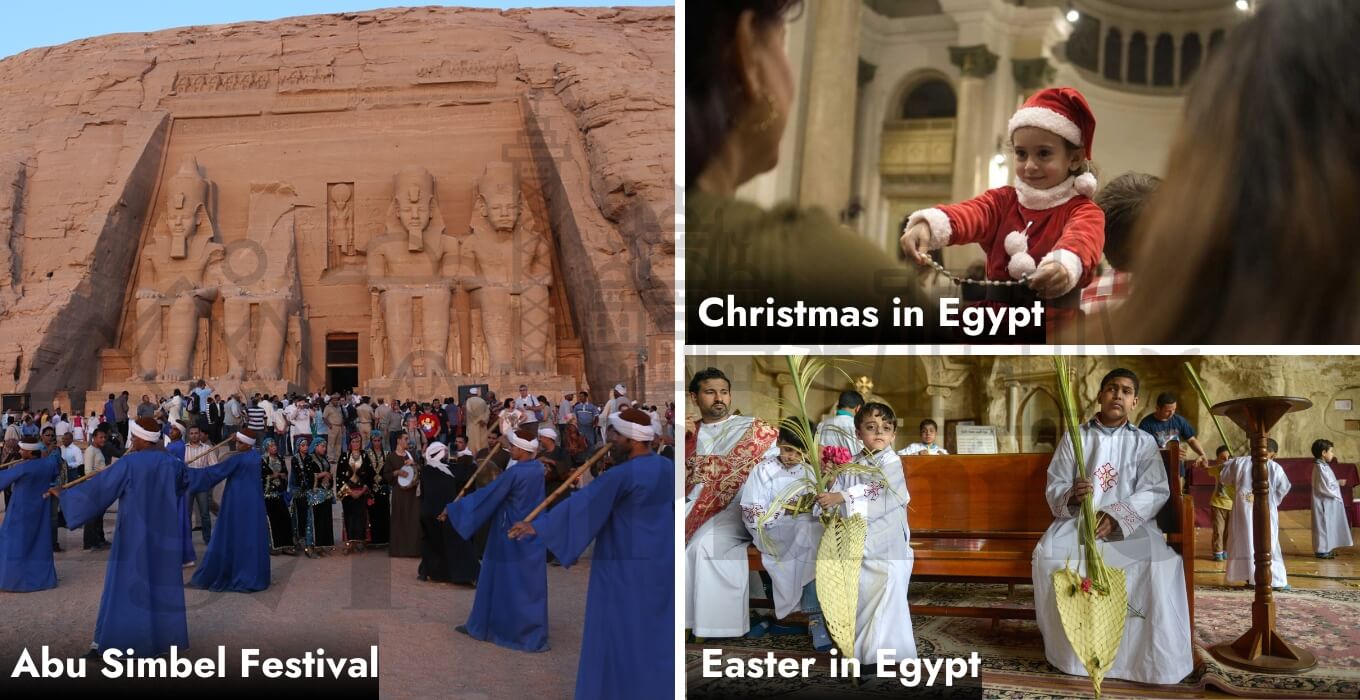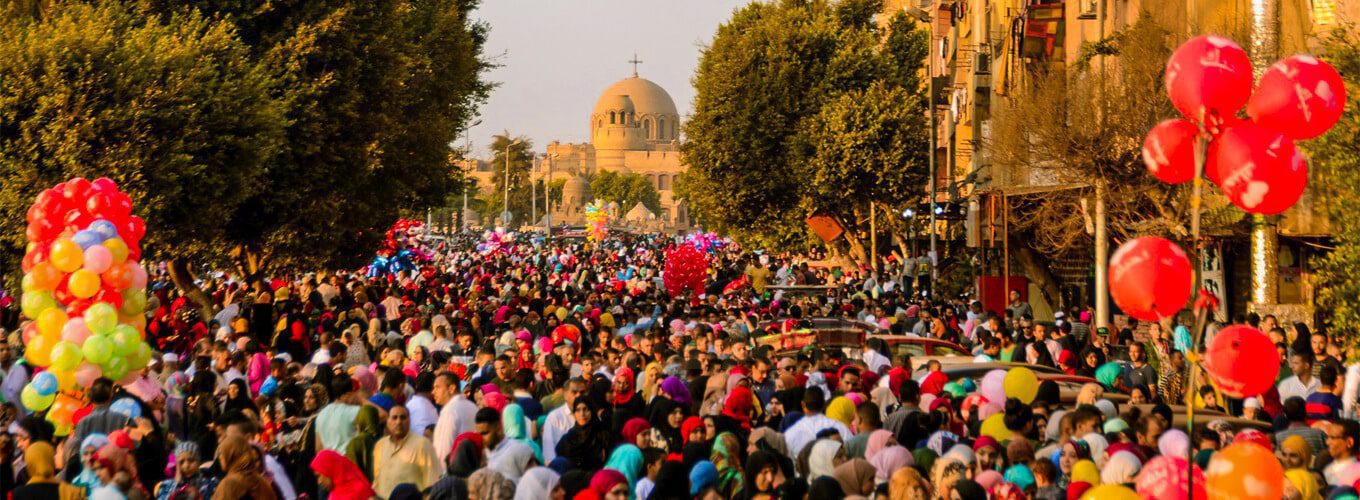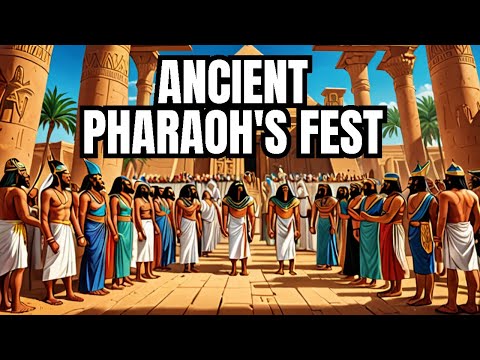Do you want to dive into Egyptian holidays and traditions? Egyptian festivals and celebrations are the perfect way to do that. They let you see the heart of this ancient land. You’ll enjoy everything from the Nile’s beats to Pharaonic celebrations.
Discover Egypt in terms of celebrations, whether they are modern Egyptian festivals, ancient Egyptian festivals, Egypt religious celebrations, or cultural holidays in Egypt
These festivals give you a cultural experience you won’t forget, making you appreciate Egyptian life more.
Key Takeaways
- Egypt has many festivals, including religious, political, and traditional ones. They offer a full calendar of events for everyone.
- Egypt’s festivals are deeply rooted in tradition and rituals. They create a lively atmosphere where people can see and join in faith and commemorative events.
- Egypt’s history and culture have shaped its festivals. The country’s ancient rule left behind amazing buildings that are still loved and kept today.
- Modern festivals, like the Pharaonic Wedding and Wafaa Al Nil, mix old traditions with new art. They give festival-goers a variety of cultural experiences.
- Egypt’s festivals show the country’s diverse religious and cultural influences. They highlight the importance of both Islamic and Christian traditions in Egypt.
Take advantage of our discounted offers with the following All-Inclusive Vacations to Egypt
- 7-Day Cairo with Nile Cruise Tour Package Get -100 USD
- 8 Days Cairo with 3 Nights Nile Cruise by Flight Get 10% Off + Free Activities
- 8 Days Cairo and Nile Cruise Holidays with Abu Simbel Get 7% OFF
- 10-Day Cairo, Alexandria, and Nile Cruise with Abu Simbel by Flight Get 10% OFF
- 12 Day Cairo City & Nile Cruise and Hurghada City
Egyptian Festivals and Celebrations

Egypt’s culture is rich with festivals and celebrations. These events mix ancient traditions with modern ones. Visitors can dive into Egyptian culture through these events.
Eid al-Fitr is a big festival in Egypt. It marks the end of Ramadan. Families come together to eat, give gifts, and think about their spiritual journey.
The Coptic Christmas is special for Egypt’s Christians. It’s on January 7th. People feast, celebrate, and wish each other well.
Sham El-Nessim is Egypt’s Spring Festival. It’s on Monday after Coptic Easter. Families enjoy food and celebrate spring together.
|
Festival |
Date |
Description |
Public Holiday |
|
Ramadan |
Varies (9th month of Islamic calendar) |
Month of fasting, prayer, reflection, and community |
No |
|
Moulid Al-Nabi |
Varies (12th Rabi’ al-awwal) |
Celebration of the Prophet Muhammad’s birthday |
No |
|
Eid Fitr |
Varies (1st Shawwal) |
Festival marking the end of Ramadan |
Yes |
|
Eid al Adha |
Varies (10th Dhu al-Hijjah) |
Festival of Sacrifice, commemorating Ibrahim’s willingness to sacrifice his son |
Yes |
|
Islamic New Year |
Varies (1st Muharram) |
Marks the beginning of the Islamic lunar calendar |
No |
|
Moulid Abu el-Haggag |
Varies |
Celebration of the birth of Abu el-Haggag, a local saint in Luxor |
No |
|
Coptic Christmas in Egypt |
January 7 |
Celebration of the birth of Jesus Christ according to the Coptic calendar |
Yes |
|
Coptic Easter in Egypt (Sham al Nessim) |
Varies (Spring) |
Celebration of the resurrection of Jesus Christ, followed by Sham al Nessim, a spring festival |
Yes |
|
Eastern Orthodox Christmas |
January 7 |
Celebration of the birth of Jesus Christ according to the Eastern Orthodox calendar |
No |
|
Abu Simbel Festival |
February 22 & October 22 |
Celebration marking the twice-yearly solar phenomenon at Abu Simbel temples |
No |
|
Egyptian National Day |
July 23 |
Commemoration of the 1952 Revolution |
Yes |
|
Sinai Liberation Day |
April 25 |
Celebration of the withdrawal of Israeli troops from the Sinai Peninsula in 1982 |
Yes |
Ramadan In Egypt
Ramadan In Egypt, is a big festival for Muslims everywhere. It’s a month of fasting, where people don’t eat or drink from dawn till dusk. At sunset, they break their fast with iftar, a time of joy and sharing.
This month is also when the Quran’s first verses were revealed to the Prophet Muhammad. For Egyptians, it’s a time of deep spiritual connection. They fast from dawn to dusk, with the fast ending marked by a cannon’s sound.
People go to mosques for evening prayers during Ramadan. They start their iftar with dates and a drink like milk. Egypt makes sure everyone eats after fasting with free iftar meals.
The fanoos, or traditional lanterns, light up cities and homes. The cannon firing to end fasting is an old Egyptian tradition. It’s still seen today during Ramadan.
Ramadan is the ninth month of the Islamic calendar. Muslims don’t eat during the day. They have two meals: iftar and sohour. The month is filled with traditions like fanoos and street drummers.
If you visit Egypt in Ramadan, respect local customs. Don’t eat in front of fasting Muslims and dress modestly. Ramadan brings a special cultural experience with its food, decorations, and community spirit.
Moulid an-Nabi
Moulid an-Nabi is a big festival in Egypt to celebrate Prophet Muhammad’s birth. It’s filled with colorful processions, Sufi rituals, and family gatherings. Cairo’s Khan el-Khalili district buzzes with music, dance, and traditional sweets.
Colorful Processions and Traditions
The “Leila el-Kebira” or “Big Night” is the festival’s highlight. Sufi brotherhoods wear fancy costumes and do the Zikr. This is a ritual of swaying and chanting to honor the Prophet. It’s a chance to see how much Egyptians love prophet Mohammed.
Moulid an-Nabi happens on the 12th day of Rabi’ al-Awwal, which is October 19th in 2021. Egypt makes October 21st a public holiday for it. Countries like Algeria, Bahrain, Iraq, Kuwait, and Yemen also celebrate it.
At Moulid an-Nabi, mosques in Cairo give out meat sandwiches. People enjoy traditional sweets like halawiyat and baklava.
“The Moulid observance is generally approved of across the four Sunni schools of law and is a recognized national holiday in most Muslim-majority countries.”
Moulid an-Nabi is a special time for Egyptians to celebrate their Sufi traditions. It shows their deep respect for prophet Mohammed. Visitors can dive into the fun and learn about this important Islamic festival.
Coptic Christmas in Egypt
In Egypt, the Coptic Orthodox Christmas is a special event. It’s a time of joy and celebration for the Copts, one of the oldest Christian groups. They celebrate this holiday with great joy and respect.
The Coptic Christmas is on January 7th. It’s a big deal for Coptic Christians, who are about 10-15% of Egypt’s people. The Coptic Orthodox Church, led by the Pope of Alexandria, helps celebrate this important day.
Before Christmas, Copts fast for 43 days. They don’t eat meat or dairy. Then, they have a big feast with foods like lenten bread and mushroom soup.
The night before Christmas, Copts fast and then celebrate. They have a special Mass that starts at 8 pm and goes till midnight. It’s filled with songs, prayers, and candles to remember the Holy Family’s journey.
Christmas in Egypt is also about fun and gifts. You can buy decorations and even Christmas trees. Kids look forward to Santa Claus, or “Baba Noel,” who brings them presents.
The Coptic Christmas is tied to Egypt’s history and culture. The story of the Holy Family’s journey is a big part of the celebration. Churches are decorated with lamps and candles to honor this event.
When Egyptians celebrate Coptic Christmas in Egypt, they show their rich traditions and faith. It’s a special time for both locals and visitors to experience the joy and history of the Coptic community.
You can delve deeper and understand everything about Christmas in Egypt through us
Coptic Easter in Egypt (Sham al Nessim)
Sham al Nessim is a special celebration in Egypt. It mixes ancient Egyptian and Coptic Christian traditions. It happens in late April, welcoming spring and new life.
Easter is at the center of Sham al Nessim. It’s celebrated in late March or early April. Coptic Christians, however, celebrate on April 24, using the Julian calendar.
The roots of Sham al Nessim go back to ancient Egypt. The Shemu festival, dating to 2700 BCE, celebrated the spring equinox. Over time, it merged with Coptic traditions.
On Sham al Nessim, people of all faiths come together. They enjoy picnics, Nile cruises, and visits to zoos and parks. They eat traditional foods like fisikh (dried mullet fish) and termes (lupin beans).
Eggs are a big part of the celebration. They symbolize rebirth and renewal. People decorate and hang them outside, wishing for a good year.
Sham al Nessim brings people together, beyond religion and culture. It’s celebrated along the Nile and at the Luxor Temple. It’s a time of joy and connection with Egypt’s heritage.
Eastern Orthodox Christmas
In Egypt, besides Coptic Christmas, there’s Eastern Orthodox Christmas on January 7th. This holiday is for the Eastern Orthodox Christian community in Egypt. It’s a public holiday, with offices and many shops closed.
Celebrations include midnight mass, feasting, and gift-giving. The Eastern Orthodox Christmas in Egypt shows the country’s diverse religious heritage. It’s a mix of cultures and faiths, making Egypt interesting.
Visiting Egypt during Eastern Orthodox Christmas is unforgettable. You can see the markets in Cairo or relax on Red Sea beaches. The 45-day fast before and the celebrations on January 6th and 7th are special. They show Egypt’s rich cultural traditions.
Sham El-Nessim
Spring brings new life to Egypt, and Sham El-Nessim celebrates this. This ancient festival dates back to around 2700 BCE. It’s a time to enjoy the outdoors and try new foods.
People gather by the Nile River for picnics and fun. They eat traditional foods like fisikh, a salted fish. They also enjoy spring onions, fresh greens, eggs, and baladi bread.
Sham El-Nessim brings everyone together. It’s a time for families and friends to enjoy the outdoors. They picnic, camp, and celebrate spring’s arrival.
This year, Sham El-Nessim might be different due to the pandemic. But the joy and tradition will still be there. Egyptians will find ways to celebrate, even if it’s in small groups.
|
Key Facts About Sham El-Nessim |
|
– Sham el-Nessim falls on 25 April this year, always one day after Coptic Easter |
|
– Sham el-Nessim has a history that dates back to around 2700 BCE |
|
– The Sham el-Nessim celebration lasts for one day only |
|
– Sham el-Nessim is one of the very few festivals celebrated by Egyptians regardless of their faith |
|
– Fisikh, a traditional food associated with Sham el-Nessim, is dried in the sun and left in salt for several months to a year before consumption |
|
– Sham El-Nessim is similar to Nowruz, the Persian New Year celebration |
|
– Sham El-Nessim is one of Egypt’s oldest festivals, tracing back thousands of years to Pharaonic times |
Eid Fitr
Eid Fitr is a big Islamic festival in Egypt. It celebrates the end of Ramadan. People come together to enjoy food, gifts, and each other’s company.
The festival starts with special prayers in mosques and open spaces. Families and friends meet to say “Eid Mubarak.” They also eat traditional foods like Kahk and Zalabia.
Eid Fitr is a national holiday in Egypt. Offices and many businesses are closed. People visit their loved ones, share meals, and give gifts, especially to kids.
The celebration fills the air with music and laughter. TV shows special programs, including live interviews. The streets buzz with joy.
Seeing Eid Fitr in Egypt is special. It lets you see the country’s traditions and its Islamic heritage. It’s a chance to connect with the local culture.
Eid al Adha
Eid al Adha, or the Feast of the Sacrifice, is a big Islamic holiday in Egypt. It remembers when the Prophet Abraham was ready to sacrifice his son for God. People sacrifice animals like sheep and goats, then share the meat with the poor.
This holiday is a time for families and friends to come together. They watch and help with the animal sacrifices. It shows their faith, obedience, and unity.
The sacrifice happens outside the city or in special places. A quick and painless kill is ensured. The meat is then given to those in need.
Eid al Adha is a national holiday in Egypt. Many people travel to see their loved ones. It’s a major festival for Muslims all over the world.
|
Eid al Adha Traditions |
Details |
|
Animal Sacrifice |
The tradition of Eid al Adha involves the sacrifice of an animal, such as a cow, sheep, or goat, as a part of the celebration. |
|
Meat Distribution |
The meat from the slaughtered animals is shared among family and friends, with the majority of the meat being donated to the poor. |
|
Community Celebration |
Families and communities come together to witness and participate in the slaughtering of animals, which is done in a manner that minimizes pain and ensures a swift death. |
|
Commemoration of Prophet Ibrahim |
The festival involves rituals and practices that commemorate the story of Ibrahim and Ishmael from the Quran. |
Eid al Adha is a key part of the Islamic calendar. It’s celebrated with other important holidays like Eid Fitr and Moulid Al-Nabi. It’s a time of sacrifice, community, and charity, loved by the Egyptian Muslim community.
Islamic New Year
The Islamic lunar calendar shines bright with the Islamic New Year, or El Hijra. It’s a big deal in Egypt’s religious and cultural life. It remembers when the Prophet Muhammad moved from Mecca to Medina. This move is seen as the start of the hijri calendar.
The Islamic calendar follows the moon, so the new year changes every year. It moves about 11 days earlier each year. In Egypt, this holiday is a time for fun, community, and thinking deeply about faith.
In Egypt, people celebrate with great joy and respect. Mosques have special prayers and talks. Families and friends come together for meals, gifts, and old traditions. The lunar calendar and religious festivals in Egypt are very important. They remind everyone of their rich heritage.
With the Islamic new year, Egyptians look to the future with hope. They look forward to a year filled with faith, community, and celebrating their Islamic holidays.
Moulid Abu el-Haggag
Dive into the lively Moulid Abu el-Haggag festival, a top religious festival in Egypt. It’s held in Luxor and celebrates the Sufi saint Abu el-Haggag. It also highlights the area’s rich culture.
The Moulid Abu el-Haggag is a 3-day event in the Islamic month of Sha’aban, before Ramadan. It’s famous for a boat procession through Luxor’s streets. This draws big crowds to see this old tradition.
The boats are filled with dancing boys playing music. They make the festival lively and fun.
The festival is more than just the boat procession. It’s a big celebration of Egyptian culture and heritage. You can find carnival rides and vendors selling things. There’s also Tahtib, an ancient martial art, and Sufi tents with spiritual music and rituals.
The Mirmah event is a big part of the festival. It shows off local horseback riders’ speed and agility. The festival ends with the Dora parade. This parade features camels, people with sticks, and business vehicles.
Abu Simbel Sun Festival

See the amazing Abu Simbel Sun Festival, a big event that happens twice a year. It’s at the Abu Simbel temple complex near Luxor. The famous pharaoh Ramses II built it, making sure the sun shines inside on special days.
These days are when Ramses became king (February 22nd) and his birthday (October 22nd). The sun’s rays light up the inner temple, creating a stunning sight. This has drawn people from all over for centuries.
Thousands come to see this wonder. They celebrate this special event, diving into Egypt’s rich culture.
Celebrating the Architectural Wonders of Ancient Egypt
The Abu Simbel temples are huge, with giant statues of Ramses II and his wife Nefertari. They are the biggest sculptures from ancient times left today. The skill in building them shows how smart ancient Egyptians were.
The festival lets visitors see the temples, learn their history, and enjoy Egypt’s culture. You can hear traditional music, watch dances, and try local food. There are also markets for special souvenirs.
If you love history, and architecture, or just want to see something amazing, don’t miss the Abu Simbel Sun Festival. It’s a chance to see ancient Egypt’s lasting impact.
Egyptian National Day
Egypt’s National Day is on July 23rd every year. It’s a big public holiday. It remembers the 1952 revolution that changed Egypt into the republic it is today.
On this day, government offices and many businesses close. This lets Egyptians enjoy many fun activities. They have parades, cultural events, and parties that bring everyone together.
Egypt’s National Day is more than just politics. It’s also about the country’s culture. People do traditional music, dance, and show off their crafts and food. It shows the strong spirit of the Egyptian people.
If you’re in Egypt on this day, you can really feel the culture. You’ll see big parades in Cairo and small parties in villages. It’s a chance to see the pride and traditions of Egypt.
Sinai Liberation Day
Sinai Liberation Day is a big holiday in Egypt, celebrated on April 25th. It remembers when the Sinai Peninsula came back to Egypt in 1982. This ended the Israeli occupation that started in 1967.
People celebrate with parades, cultural events, and gatherings. These show Egypt’s pride and the Sinai’s importance to the country.
Egyptians look forward to this day every year. It reminds them of their nation’s strength, freedom, and culture. It’s especially important because of the ongoing tensions with Israel.
The celebrations include famous artists like Tamer Hosny, Angham, and Essam Elsakka. They honor the bravery and sacrifices of those who fought for the Sinai. The day also warns any potential threats to Egypt’s land.
Other Egyptian Festivals & Holidays
Nile River Celebrations
The Nile River has been key to Egyptian life for thousands of years. Festivals and celebrations show the deep respect for this vital waterway. Wafaa El-Nil is a major festival that honors the Nile’s annual rise and the land’s renewal.
Wafaa El-Nil: Honoring the Life-Giving River
Wafaa El-Nil used to include sacrificial rituals. Now, people picnic, camp, and enjoy the fun along the riverbanks. You can also take a felucca ride, a traditional sailboat, to see the Nile’s beauty.
This experience lets you feel the heart of rural Egyptian life. The Nile’s importance in Egyptian culture is clear. Its festivals show the strong connection between people and their river.
|
Nile River Celebrations |
Description |
|
Wafaa El-Nil |
Celebrates the annual rising of the Nile’s waters and the subsequent renewal of the land’s fertility. |
|
Felucca Rides |
Traditional wooden sailboats that allow visitors to experience the beauty of the Nile River. |
|
Rural Life Immersion |
Attending Nile River celebrations offers a glimpse into the rhythms and traditions of rural Egyptian life. |
“The Nile’s centrality to Egyptian culture is undeniable, and its festivals and celebrations are a testament to the enduring bond between the people and their life-giving river.”
Ancient Egyptian Festivals
Egypt’s ancient people were known for their grand festivals and rituals. These were tied to their rich myths and beliefs. The Wepet Renpet, or the ancient Egyptian New Year, was a big deal. It happened during the Akhet, when the Nile flooded.
Wepet Renpet: The Ancient Egyptian New Year
This celebration was filled with joy and offerings to the gods. The Egyptians hoped for a good harvest and prosperity. The Wepet-Renpet Festival showed how popular the Osiris story was back then.
Opet Festival: Celebrating the Fertility of the Nile
The Opet Festival was held at the Karnak Temple in Luxor. It celebrated the Nile’s fertility and the pharaoh’s power. The festival included big processions and rituals, showing the Egyptians’ bond with the Nile.
These rituals and festivals were a big part of life in Egypt. They were named after festivals, even after Egypt became Christian. These events were important for religion, farming, and social life. They showed the rich culture of ancient Egypt.
Vibrant Cultural Events and Traditions in Egypt
Egypt’s festivals show off the country’s rich history and diverse culture. The Moulid an-Nabi has colorful processions and Sufi rituals. Coptic Christmas and Easter bring joy and feasting. These Egyptian cultural events let visitors dive into the nation’s traditions.
The Abu Simbel Sun Festival lights up ancient temples. The Nile River celebrations honor the life-giving Nile. Egypt’s festivals and Egyptian holidays and traditions celebrate the people’s spirit and resilience.
Music, modern art, and food highlight Egypt’s cultural diversity. The Downtown Contemporary Arts Festival (D-CAF) in Cairo is a big event. The Cairo International Film Festival and Cairo Jazz Festival also show Egypt’s artistic talent.
Egypt local festivals and egypt traditional holidays keep the country’s celebrations alive. The Cairo Bites Food Festival and Sham El-Nessim celebrate spring. These holiday traditions in Egypt amaze and inspire visitors from everywhere.
FAQs: Egyptian Festivals and Celebrations
What Are the Top Cultural Holidays in Egypt?
- Sham El Nessim: This ancient spring festival, celebrated in April, dates back to the pharaonic era. Egyptians enjoy picnics, family gatherings, and eating traditional foods like salted fish and colored eggs.
- Eid al-Fitr: Marks the end of Ramadan, the holy month of fasting. It’s a joyous celebration filled with family gatherings, feasting, and exchanging gifts.
- Eid al-Adha: Commemorates Abraham’s willingness to sacrifice his son. It involves animal sacrifices, prayers, and festive meals shared with family and friends.
- Moulid al-Nabi: Celebrates the birth of the Prophet Muhammad. Mosques are decorated, and there are special prayers, processions, and sweets distributed.
- Coptic Christmas: Celebrated by Egypt’s Coptic Christian community on January 7th. It involves special church services, family gatherings, and traditional foods.
What Festivals Are Celebrated in Egypt?
- Abu Simbel Sun Festival: Occurs twice a year (February and October) when the sun’s rays illuminate the inner sanctuary of the Abu Simbel temple.
- Wafaa El-Nil Festival: Celebrates the annual flooding of the Nile River, vital for agriculture. It includes parades, music, and traditional performances.
- Moulids: These are local festivals celebrating the birthdays of Sufi saints. They involve music, dancing, and religious processions.
What Important Holiday is Celebrated in Egypt?
Revolution Day (July 23rd): Commemorates the 1952 revolution that overthrew the monarchy and established the modern Egyptian republic.
What is The Most Popular Festival in Ancient Egypt?
The Opet Festival: A grand celebration honoring the god Amun-Re and the pharaoh. It involved processions of sacred boats and statues between Karnak and Luxor temples.
What Are Some Traditions in Egypt?
- Hospitality: Egyptians are known for their warm hospitality and welcoming nature towards guests.
- Family-oriented culture: Family ties are very strong, and extended family gatherings are common.
- Ramadan: The holy month involves fasting from sunrise to sunset, increased prayer, and spiritual reflection.
- Traditional clothing: While many Egyptians wear modern clothing, some traditional attire like the galabiya for men and the hijab for women is still seen.
- Coffee and tea culture: Egyptians enjoy socializing over cups of strong coffee or sweet tea.
- Ancient heritage: Many Egyptians take pride in their ancient heritage and the legacy of the pharaohs.
Conclusion: Egyptian Festivals and Celebrations
Egyptian festivals and celebrations show the country’s rich ancient Egyptian culture. These events mix old pharaonic rituals with today’s religious festivals and seasonal celebrations. They let visitors feel Egypt’s heart and soul.
Visitors can enjoy many festivals. There’s the Moulid an-Nabi with its colorful processions. Or the Coptic Christmas and Easter with its food and fun. And the Abu Simbel temples light up the night.
Every Egypt local festival and cultural holiday in Egypt is special. They show Egypt’s Egypt traditional holidays and modern Egyptian festivals. These celebrations give a peek into Egypt’s lively culture.
Explore Our Exciting Tours:
- Overnight Trip to Alexandria from Cairo
- Egypt Tours for Families
- Bahariya Safari Tour
- Egypt Cultural Tours
- Top Reasons to Visit Egypt
- Discover Egypt Outdoor Activities


